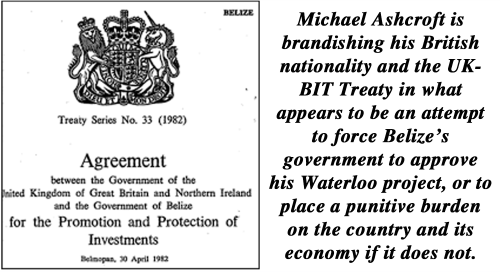Photo: Michael Ashcroft
A Notice of Arbitration addressed to Prime Minister Hon. John Briceño marks the commencement of yet another international legal battle with Lord Michael Ashcroft. His legal team of UK lawyers has proposed the Permanent Court of Arbitration in the Hague, the Netherlands, as the authority to review and deliver a judgment on this claim. They are awaiting agreement on this proposal from PM Briceño.
by Marco Lopez
BELMOPAN, Thurs. Apr. 13, 2023
Prime Minister Hon. John Briceño has been served with a Notice of Arbitration under the rules of the United Nations Commission on International Trade Law 2021. Two companies owned by Lord Michael Ashcroft – the British Caribbean Bank and Prize Holdings International Limited—are taking the Government of Belize before the Permanent Court of Arbitration in The Hague seeking 5 areas of relief. A letter which was sent to the Prime Minister to signal notice of the dispute, indicated that the government had three months to reach an “amicable settlement” on the matter of the environmental clearance of the Port of Belize Cruise and Cargo Terminal Project after a second denial by the Department of the Environment (DOE) following a recommendation that was issued by a 16-member National Environmental Appraisal Committee (NEAC).

That local body has outlined significant shortfalls and major unaddressed risks that it observed in the developer’s methodology which was outlined in the second iteration of the Waterloo EIA (Environmental Impact Assessment). The principals of The Port of Belize Ltd., all of who fall under the umbrella of the multi-tentacled Waterloo Investment Holdings Limited, have now doubled down. This is the second legal proceeding launched by the attorneys of the Waterloo chairman, Lord Michael Ashcroft, in response to the recent rejection of his proposed cruise port development.
This claim is being brought under Article 8 of the Agreement between the Government of the United Kingdom of Great Britain and Northern Ireland and the Government of Belize for the Promotion and Protection of Investments – referred to as the UK Bit Treaty 1982. The purpose of this instrument, which was signed into law less than a year after Belize’s independence, is to protect the investments of UK nationals. The two companies, BCB and Prize Holdings, both located in the British Overseas Territory of Turks and Caicos, fall within the scope of this protection. A previous letter that had been sent by Ashcroft to the Prime Minister on January 19 of last year, had first suggested an impending Notice of Dispute under the UK Bit Treaty. The most recent letter which notifies the GoB of the initiation of such arbitration proceedings was sent despite GoB’s confirmation to Waterloo that the process of setting up a statutory appeals tribunal to review the denial of approval for the Waterloo project was ongoing.
In a letter responding to the Ashcroft correspondence, the PM remarked that the threat of arbitration at the time was “premature.” The notice on April 3 states that this response has only “compounded and exacerbated the dispute.” Since the requested “amicable settlement” was not reached, a team of UK lawyers have been retained by Ashcroft to argue his case against Belize in front of a three-person arbitration body in the Hague.
They claim that the approximately US$300 million investment was actively encouraged, and that after the first rejection of Waterloo’s proposal on December 15, 2021, representations were made to them by the Department of the Environment (DOE) that, “if a developer applied for environmental approval for a project by submitting an Environmental Impact Assessment (the “EIA”) that met the applicable Terms of Reference, then the developer would be duly granted environmental clearance for the project.”
This first appeal never took place. Representatives from Waterloo and the DOE agreed that a new EIA would be submitted and processed on an expedited basis. This was done, and by August 2022 that new Waterloo EIA was received by the DOE. After two rounds of consultation and a request for additional information from the developers, the NEAC ultimately decided that this development—which would involve the dredging and dumping of millions of cubic meters of material near Belize’s marine areas—would pose too great of a risk to the environment, including the country’s barrier reef, and handed down its decision to not grant environmental clearance to the DOE. The DOE accepted this recommendation and informed Waterloo of the second rejection of their proposal on December 5.
In the notice, the Ashcroft companies claimed that the DOE, which had released an extensive explanation of the specific risks posed by the project and the unanswered questions surrounding its proposed containment methods, was biased in its decision-making. They claimed that the DOE, “Applied different and more stringent standards to the applications made by PBL than those which had been applied to other, comparable, applications for environmental approval, including especially the applications made by two greenfield developments: Port of Magical Belize and Stake Bank.”
And they insisted that they engaged in a, “lengthier and more onerous process for considering the applications made by PBL than those which were applied to other, comparable applications for environmental approval.” They then suggested that this gave “rise to the inference that the DOE was acting for ulterior or corrupt purposes in granting environmental approval to projects proposed by PBL’s competitors.”
In regard to the ongoing Waterloo Appeal Tribunal—on which Paul Hunt, Sr., was appointed to serve as private sector representative after Lucy Fleming chose not to take the position — the companies say the government, “wrongfully interfered with the constitution of the Environment Tribunal as an independent and impartial arbiter of the appeal.” (They did not indicate whether they would have expressed the same level of concern about impartiality if Kevin Herrera, the business senator who would have otherwise sat on the tribunal, and whose brother is a consultant for the Waterloo project, had retained his tribunal seat.)
In the notice, Lucy Fleming, who had been proposed as a possible tribunal member, and Professor Terrence Hughes, who sits on the tribunal as one of its three members, are referred to as individuals with “recorded and evidenced bias.”
“The Claimants reserve their right to bring additional claims of violation of the BIT in respect of the Respondent’s continued failure to address the appeal,” the notice further states.
We note that a proceeding in the domestic High Court was initiated by local Ashcroft lawyers in an attempt to have the court strike down SI 23 of 2023 which legislated the recomposition of the appeals tribunal. They claimed that the tribunal which was selected following this amendment, which included Fleming, was “tainted with bias and will likely breach the claimant’s rights.”
BCB and Prize have retained attorneys from Essex Court Chambers and Clifford Chance LLP in the UK to seek five areas of relief: a declaration that Belize has violated the UK BIT Treaty, a monetary award to compensate for the harm caused by the aforesaid breaches, to be quantified in subsequent pleadings; an award of costs in the arbitration, an award of interest on the monetary compensation (including awarded costs) up to the date of payment; and such other relief as the Tribunal determines is appropriate.
This Notice of Arbitration was served on PM Briceño 10 days ago on April 3. Paul Hunt, Sr. was appointed to the Tribunal on April 5. As mentioned, the government of Belize must now signal whether or not it consents to having the Permanent Court of Arbitration in the Hague serve as the arbitral body for this case. Three arbitrators will sit to hear this latest proceeding initiated by Lord Michael Ashcroft against the Government of Belize.

